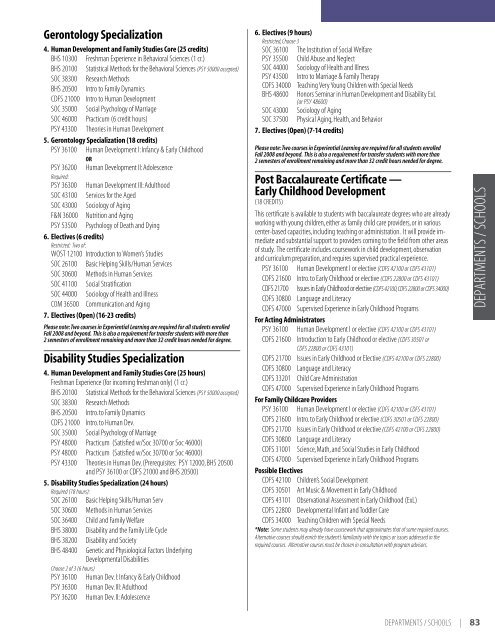Download - Purdue University Calumet
Download - Purdue University Calumet
Download - Purdue University Calumet
You also want an ePaper? Increase the reach of your titles
YUMPU automatically turns print PDFs into web optimized ePapers that Google loves.
Gerontology Specialization<br />
4. Human Development and Family Studies Core (25 credits)<br />
BHS 10300 Freshman Experience in Behavioral Sciences (1 cr.)<br />
BHS 20100 Statistical Methods for the Behavioral Sciences (PSY 50000 accepted)<br />
SOC 38300 Research Methods<br />
BHS 20500 Intro to Family Dynamics<br />
CDFS 21000 Intro to Human Development<br />
SOC 35000 Social Psychology of Marriage<br />
SOC 46000 Practicum (6 credit hours)<br />
PSY 43300 Theories in Human Development<br />
5. Gerontology Specialization (18 credits)<br />
PSY 36100 Human Development I: Infancy & Early Childhood<br />
OR<br />
PSY 36200 Human Development II: Adolescence<br />
Required:<br />
PSY 36300 Human Development III: Adulthood<br />
SOC 43100 Services for the Aged<br />
SOC 43000 Sociology of Aging<br />
F&N 36000 Nutrition and Aging<br />
PSY 53500 Psychology of Death and Dying<br />
6. Electives (6 credits)<br />
Restricted: Two of:<br />
WOST 12100 Introduction to Women’s Studies<br />
SOC 26100 Basic Helping Skills/Human Services<br />
SOC 30600 Methods in Human Services<br />
SOC 41100 Social Stratification<br />
SOC 44000 Sociology of Health and Illness<br />
COM 36500 Communication and Aging<br />
7. Electives (Open) (16-23 credits)<br />
Please note: Two courses in Experiential Learning are required for all students enrolled<br />
Fall 2008 and beyond. This is also a requirement for transfer students with more than<br />
2 semesters of enrollment remaining and more than 32 credit hours needed for degree.<br />
Disability Studies Specialization<br />
4. Human Development and Family Studies Core (25 hours)<br />
Freshman Experience (for incoming freshman only) (1 cr.)<br />
BHS 20100 Statistical Methods for the Behavioral Sciences (PSY 50000 accepted)<br />
SOC 38300 Research Methods<br />
BHS 20500 Intro. to Family Dynamics<br />
CDFS 21000 Intro. to Human Dev.<br />
SOC 35000 Social Psychology of Marriage<br />
PSY 48000 Practicum (Satisfied w/Soc 30700 or Soc 46000)<br />
PSY 48000 Practicum (Satisfied w/Soc 30700 or Soc 46000)<br />
PSY 43300 Theories in Human Dev. (Prerequisites: PSY 12000, BHS 20500<br />
and PSY 36100 or CDFS 21000 and BHS 20500)<br />
5. Disability Studies Specialization (24 hours)<br />
Required (18 hours):<br />
SOC 26100 Basic Helping Skills/Human Serv<br />
SOC 30600 Methods in Human Services<br />
SOC 36400 Child and Family Welfare<br />
BHS 38000 Disability and the Family Life Cycle<br />
BHS 38200 Disability and Society<br />
BHS 48400 Genetic and Physiological Factors Underlying<br />
Developmental Disabilities<br />
Choose 2 of 3 (6 hours)<br />
PSY 36100 Human Dev. I: Infancy & Early Childhood<br />
PSY 36300 Human Dev. III: Adulthood<br />
PSY 36200 Human Dev. II: Adolescence<br />
6. Electives (9 hours)<br />
Restricted, Choose 3<br />
SOC 36100 The Institution of Social Welfare<br />
PSY 35500 Child Abuse and Neglect<br />
SOC 44000 Sociology of Health and Illness<br />
PSY 43500 Intro to Marriage & Family Therapy<br />
CDFS 34000 Teaching Very Young Children with Special Needs<br />
BHS 48600 Honors Seminar in Human Development and Disability ExL<br />
(or PSY 48600)<br />
SOC 43000 Sociology of Aging<br />
SOC 37500 Physical Aging, Health, and Behavior<br />
7. Electives (Open) (7-14 credits)<br />
Please note: Two courses in Experiential Learning are required for all students enrolled<br />
Fall 2008 and beyond. This is also a requirement for transfer students with more than<br />
2 semesters of enrollment remaining and more than 32 credit hours needed for degree.<br />
Post Baccalaureate Certificate —<br />
Early Childhood Development<br />
(18 credits)<br />
This certificate is available to students with baccalaureate degrees who are already<br />
working with young children, either as family child care providers, or in various<br />
center-based capacities, including teaching or administration. It will provide immediate<br />
and substantial support to providers coming to the field from other areas<br />
of study. The certificate includes coursework in child development, observation<br />
and curriculum preparation, and requires supervised practical experience.<br />
PSY 36100 Human Development I or elective (CDFS 42100 or CDFS 43101)<br />
CDFS 21600 Intro. to Early Childhood or elective (CDFS 22800 or CDFS 43101)<br />
CDFS 21700 Issues in Early Childhood or elective (CDFS 42100, CDFS 22800 or CDFS 34000)<br />
CDFS 30800 Language and Literacy<br />
CDFS 47000 Supervised Experience in Early Childhood Programs<br />
For Acting Administrators<br />
PSY 36100 Human Development I or elective (CDFS 42100 or CDFS 43101)<br />
CDFS 21600 Introduction to Early Childhood or elective (CDFS 30501 or<br />
CDFS 22800 or CDFS 43101)<br />
CDFS 21700 Issues in Early Childhood or Elective (CDFS 42100 or CDFS 22800)<br />
CDFS 30800 Language and Literacy<br />
CDFS 33201 Child Care Administration<br />
CDFS 47000 Supervised Experience in Early Childhood Programs<br />
For Family Childcare Providers<br />
PSY 36100 Human Development I or elective (CDFS 42100 or CDFS 43101)<br />
CDFS 21600 Intro. to Early Childhood or elective (CDFS 30501 or CDFS 22800)<br />
CDFS 21700 Issues in Early Childhood or elective (CDFS 42100 or CDFS 22800)<br />
CDFS 30800 Language and Literacy<br />
CDFS 31001 Science, Math, and Social Studies in Early Childhood<br />
CDFS 47000 Supervised Experience in Early Childhood Programs<br />
Possible Electives<br />
CDFS 42100 Children’s Social Development<br />
CDFS 30501 Art Music & Movement in Early Childhood<br />
CDFS 43101 Observational Assessment in Early Childhood (ExL)<br />
CDFS 22800 Developmental Infant and Toddler Care<br />
CDFS 34000 Teaching Children with Special Needs<br />
*Note: Some students may already have coursework that approximates that of some required courses.<br />
Alternative courses should enrich the student’s familiarity with the topics or issues addressed in the<br />
required courses. Alternative courses must be chosen in consultation with programadvisors.<br />
departments / schools<br />
departments / schools | 83

















